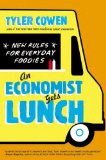Summary | Excerpt | Reviews | Beyond the Book | Readalikes | Genres & Themes | Author Bio

New Rules for Everyday Foodies
by Tyler Cowen1
On the Eve of the Revolution
American food is in crisis, and rarely has more disruption loomed before us. People are rebelling against current food-production methods involving long-distance shipping, fertilizers, and genetically modified organisms. Many people have returned to eating locally grown food from small farms, and there is a fear that our agricultural practices lead to mass-produced food products that are bad for our health and worsen climate change. But is this fear well founded? Is local food a good thing?
On the other side of the ledger, we are spending more and more on fancy restaurants. At a time when many economic sectors are struggling, the choices for fine meals are expanding in most American cities. But are we spending our money in the best way possible, or are we overlooking cheaper and possibly superior alternatives?
In a world with some pretty big problems, is it even appropriate to think of food in aesthetic terms as much as we do? The backlash drove a recently published article in the Atlantic Monthly to suggest that foodies are evil for aestheticizing the experience of eating. But what could be morally wrong with eating good, even beautiful food?
The food crisis is not confined to cultured readers of urbane magazines. As the fallout from our larger economic crisis continues, more than forty-four million Americans are receiving food stamps. High unemployment has persisted far longer than politicians expected. Starvation is no longer a major American problem, but obesity is - especially among lower earners. The prevalence of diabetes continues to rise.
The news isn't all bad. The American restaurant scene has been transformed over the last few decades since Calvin Trillin wrote (hilariously) about pretentious dining establishments, which he collectively referred to as "La Maison de la Casa Haus." Bolivian, Laotian, and North Korean dishes are staples of my dining out. I know how "Husband and Wife Lung Slices" taste (not bad). Where government regulations allow, food trucks are proving more popular than a lot of sit-down restaurants - and it's not just a desire to get away from those lung slices.
But most seriously, as our global population grows to nine billion and beyond and agricultural productivity slows, another Green Revolution propelled by agricultural innovations will become increasingly imperative. Food prices have been rising, contributing to political unrest in Egypt and Tunisia, and help on this front seems far away. Countries are stockpiling foodstuffs; and when prices spike, governments shut down food exports with the ostensible goal of feeding their populations. The global trade network isn't as robust as we have wanted to believe.
Since Upton Sinclair self-published The Jungle, his exposé of the meat packing industry in Chicago in 1906, Americans have been repeatedly alerted to disturbing realities of their food quality and economy. However, this is an especially critical moment.
When it comes to food, the whole world needs some big changes. These changes will happen only gradually, but this book is about how you can start eating better food now for your own good and for everyone else's. We need a special kind of revolution.
Let's start with a personal story about finding good food no matter how exotic or ordinary, about finding food that simply tastes good. Constructing a better eating experience and understanding where the quality of that experience comes from, is, strangely enough, the first and most important step toward feeding those nine billion people.
A Journey into the Unknown
I was on my way to Nicaragua. No one had seemed enthusiastic about Nicaraguan food and the guidebooks were not overflowing with praise. I decided I would figure things out on arrival. Let's be clear: Every meal really matters to me.
Excerpted from An Economist Gets Lunch by Tyler Cowen. Copyright © 2012 by Tyler Cowen. Excerpted by permission of Dutton. All rights reserved. No part of this excerpt may be reproduced or reprinted without permission in writing from the publisher.




Beware the man of one book
Click Here to find out who said this, as well as discovering other famous literary quotes!
Your guide toexceptional books
BookBrowse seeks out and recommends the best in contemporary fiction and nonfiction—books that not only engage and entertain but also deepen our understanding of ourselves and the world around us.